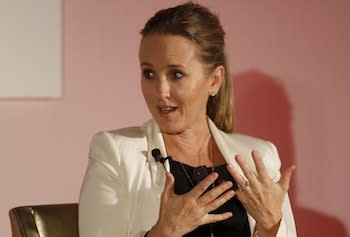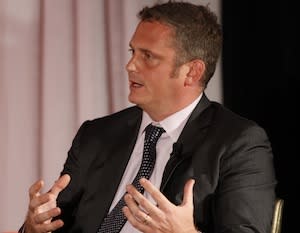NBC Hopes to Climb Out of the Cellar With Must-See TV - Again
Can the once-proud peacock network restore some of the luster to its feathers after a distressing period of languishing in fourth place among the networks?
And can it do it with shows that, unlike the roster of critical favorites like "Parks and Recreation" and "Community," are aimed at more mass appeal?
Indeed Robert Greenblatt, chairman of NBC entertainment, caught some flak at the Television Critics Association gathering in July, when he announced the intention to "broaden" the network's comedy lineup.
Those were the questions Jennifer Salke, president of NBC Entertainment and Universal Television, and Paul Telegdy, president of NBC Alternative and Late-Night Programming, tried to address at TheWrap's annual entertainment-industry conference The Grill on Tuesday.
Also read: "Arrested Development" Season 4 Footage Premieres at TheGrill
The panel had fortuitous timing for NBC -- as moderator Sharon Waxman noted at the beginning of the sit-down: The network recently took the top slot for the fall season premiere week, thanks in part to shows like the extremely popular "The Voice."
But both Salke and Telegdy admitted that the network is still in flux.
"What we're trying to do is bring quality, must-see TV back," Salke said, hearkening back to NBC's '90s heyday, when shows like "Seinfeld," "Frasier" and "Friends" dominated the national conversation.
Salke noted that when Greenblatt came aboard from Showtime in January 2011, he had his work cut out for him.
Also read: Show Some Respect: Sports Leagues Give Hollywood a Blueprint for Success
"When Bob came in, there was a selection of shows that he had to work with," Salke noted. And the Thursday-night lineup, once NBC's crowning jewel, contained series such as "Community" and "Parks and Recreation" that "don't translate to an audience on our schedule," Salke noted. ("Community" has since been moved to a Friday night timeslot.)
Also read: How HSN Stopped Screaming at People and Became a Media Arcade
"I think we're going to transition with our comedy programs and try to broaden the audience," Greenblatt said. "Those Thursday comedies, which the critics love and we love, tend to be a bit more narrow than we want going forward."
Salke and Telegdy addressed Greenblatt's statement, with Salke noting that the key is balancing edginess with content that's relevant to the largest possible audience.
"In order to have hits you have to create buzz, [and] in order to create buzz you have to have controversy," Salke noted. The goal, she said, is to get "to a place where you're inviting as many people under the tent" while still offering something risky.
"Let's say, the easiest way to redefine 'broad' is, lots of people [are] watching it," Telegdy added.
As examples, Salke cited the new Ryan Murphy offering "The New Normal" and the J.J. Abrams drama "Revolution," which envisions a world where all forms of electricity cease to exist.
"Revolution" has performed well since its premiere last month, while "The New Normal" is both "generating a buzz" and "hanging onto a number that, coming from where we were, is amazing," Salke offered.
Ironically, they, along with the Matthew Perry comedy "Go On" were given full-season pickups on Tuesday morning, just before the panel convened.
Salke and Telegdy also addressed the challenges of working in an advertiser-driven environment in an age when people aren't necessarily consuming their TV entertainment during airtime.
"Of course, we still need to be in the business of live TV," Telegdy said, stressing the need to emphasize programs that people need to watch as they air, whether because it's a live sporting event or for other compelling reasons. "It's the challenge of broadcast to create scarcity and reward expectation, which flies in the face of technology."
Telegdy touts the growing influence of the second-screen viewing experience as a way to both keep viewers glued to the set while the shows actually air, and to provide additional opportunities for advertisers.
"I think that's something that we're going to embrace," Telegdy said. "This is a way that we can create a really great interactive, chewy, sticky relationship."
And of course, the network can point to the success of "The Voice," which became a hit -- and remains one -- at a time when the network was badly in need of one.
Bottom line? "Printing the 'We Suck' T-shirts is something we no longer feel the need to do at NBC," Telegdy cracked.
Related Articles:
Seth MacFarlane on a 'Classy' Oscars, a 'Family Guy' Movie - and Stewie
'Arrested Development' Season 4 Footage Premieres at TheGrill
Chris Sacca and Jeff Jordan Talk Smart Venture Capitalism at TheGrill (Video)


